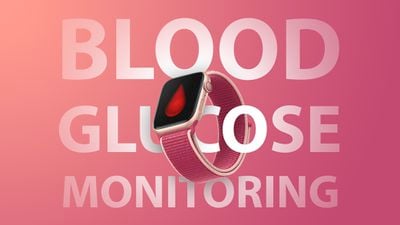Apple has made notable progress on noninvasive blood glucose monitoring technology, according to a new report from Bloomberg's Mark Gurman. Planned as a future Apple Watch feature, Apple wants to use the function to allow diabetics and others to test their blood glucose levels without needing to prick the skin for blood testing.

To test glucose levels without blood, Apple is developing a silicon photonics chip that uses optical absorption spectroscopy to shine light from a laser under the skin to determine the concentration of glucose in the body. The technology is in a "proof-of-concept" stage that is viable, but needs to be condensed to a size that can fit into a wearable.
At the current time, the prototype device is sized similarly to an iPhone and can be attached to a person's arm. That is smaller than a prior version that was big enough that it required a tabletop.
TSMC developed the main chip to power the prototype, but Apple previously worked with Rockley Photonics to create sensors and chips for glucose monitoring. Rockley Photonics in 2021 unveiled a digital sensor system that it said could monitor body temperature, blood pressure, glucose trends, hydration, alcohol, lactate, and more. Rockley Photonics made it clear that Apple was its biggest customer in regulatory filings, but Apple ultimately ended the relationship.
Apple has hundreds of engineers in its Exploratory Design Group (XDG) working on the project, but the technology is still years off. According to Bloomberg, the XDG is akin to Google's X research and development project, and it is Apple's most secretive undertaking. Apple has spent hundreds of millions of dollars developing noninvasive glucose monitoring.
Apple initially started work on alternative glucose monitoring after purchasing RareLight in 2010 under the instruction of Steve Jobs. For many years, Apple used a startup called Avolante Health LLC to work quietly on the project in a secret facility before it was transitioned to the XDG.
The under-skin glucose detection technology has been undergoing human trials for the past 10 years, with Apple using a test group of people who have prediabetes and type 2 diabetes, as well as those who have not been diagnosed as diabetic.
Apple wants to be able to warn people if they're prediabetic, enabling lifestyle changes before full-blown diabetes is developed. Apple's regulatory team is holding early discussions about getting government approval for the technology.























